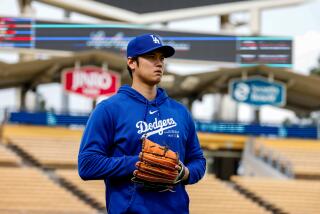Bonds’ Former Friend Linked to Grand Jury
- Share via
SAN FRANCISCO — Barry Bonds and Steve Hoskins were boyhood friends who went into business together and made a lot of money selling the San Francisco slugger’s autographs. But the relationship collapsed when Bonds accused Hoskins of stealing from him and took the case to federal prosecutors.
Now, the Redwood City businessman might be getting his revenge by talking to investigators about Bonds’ alleged steroid use and the alleged diversion of proceeds from memorabilia sales to Bonds’ girlfriends.
A grand jury considering possible perjury charges against Bonds met again here Thursday, and Bonds’ lawyer, Michael Rains, has identified Hoskins and the player’s former girlfriend, Kimberly Bell, as key witnesses in the probe.
Hoskins’ lawyer, Michael Cardoza, declined to say Thursday whether his client had testified before the grand jury, but he discussed the falling-out between his client and Bonds and said Hoskins believes the slugger’s angry outbursts at the time were caused by steroids.
“It appeared he was in a sort of steroid rage, the way he was acting,” Cardoza said. “That’s what we thought was causing him to act that way.”
Steroid allegations surrounding Bonds intensified in 2003 when he testified before a different federal grand jury about his relationship to the Bay Area Laboratory Co-Operative, the nutritional supplement lab at the center of doping scandals in track and field and baseball.
Hoskins did not return messages left Thursday at his home and business, Kent Collectibles, in San Carlos.
He and Bonds grew up together outside San Francisco and after Bonds signed with the Giants as a free agent in 1993, the ballplayer helped Hoskins go into business selling sports memorabilia bearing Bonds’ signature.
Hoskins became a fixture in the Giants’ clubhouse, but a rift opened during spring training in 2003 when Bonds spotted a fan wearing a jersey bearing his autograph that he claimed was a fake, Cardoza said.
He flew into a rage, and Hoskins had to convince him the autograph was authentic, but simmering tensions between the two came to a head, Cardoza said.
“That’s what started the big rift,” Cardoza said. “And the big rift was already going on, because Barry was demanding more from Steve. He was being even more demanding and abusive of Steve.
“The chasm between Barry and Steve really started to widen then.”
Some of the tension can be traced to an arrangement Bonds had requested for delivering money to two girlfriends, Cardoza said.
Bonds gave more than $100,000 of his profits from the business to Hoskins to pass along to those girlfriends, including down payments on homes and a car for Bell, Cardoza said.
Rains could not be reached Thursday to respond to Cardoza’s claims.
Bonds claimed Hoskins was forging the player’s signature on contracts and keeping proceeds from sales of memorabilia that was to have been split between the two partners, according to Cardoza.
Bonds made “an obscene amount of money that would make a normal human being cringe” for the autographs, but felt Hoskins was not paying him what he was owed, Cardoza said.
Soon after, Bonds went to the U.S. Attorney’s Office here and filed a complaint about Hoskins, Cardoza said.
Hoskins met with federal prosecutors, according to his lawyer. He presented detailed records of all disputed transactions and the investigation was dropped a year later, Cardoza said.
The timing of the dispute between Bonds and his former friend raises questions about whether Hoskins agreed to cooperate with federal prosecutors investigating whether Bonds lied to a grand jury in December 2003, when he reportedly said he never knowingly used performance-enhancing drugs.
A grand jury has been meeting in secret for months to consider charges against Bonds. Witnesses known to have testified in the probe include Giants trainer Stan Conte and Bonds’ surgeon, Arthur Ting.
Bonds’ personal trainer, Greg Anderson, who served three months in prison after pleading guilty last year for his role in the BALCO scandal, has been jailed since July 5 for refusing a judge’s order to testify before the grand jury.
In court papers filed with a federal appeals court Monday, Anderson’s attorney, Mark Geragos, argued that his client shouldn’t have to testify because previous grand jury testimony has been publicly disclosed. Geragos also argued that Anderson’s plea agreement last year stipulated that he would not cooperate with the government’s investigation and stated the trainer was a target of an illegal wiretap.
The government filed papers with the appeals court Thursday arguing against releasing Anderson, but asked that the submission be kept sealed. The court declined to release the government’s papers pending a ruling from a judge, expected today.
If charged with perjury and convicted, Bonds could face up to five years in prison. He could face another five years if charged and convicted of money laundering.
More to Read
Go beyond the scoreboard
Get the latest on L.A.'s teams in the daily Sports Report newsletter.
You may occasionally receive promotional content from the Los Angeles Times.









